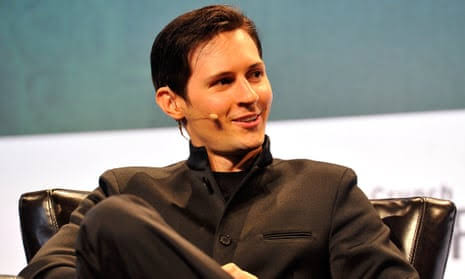Physical Address
60 Ekwema Cres, Layout 460281, Imo
Physical Address
60 Ekwema Cres, Layout 460281, Imo

Pavel Durov, the founder and CEO of the popular messaging app Telegram, was arrested on Saturday evening by French police at Le Bourget Airport, just north of Paris, after arriving in his private jet.
Durov, a dual citizen of France and the UAE, faces serious allegations linked to the app’s lack of moderation, which has reportedly allowed criminal activities to flourish among its over 950 million active users.
The arrest stems from a French warrant issued as part of an ongoing investigation into Telegram’s operations.
French authorities allege that Durov’s failure to implement adequate content moderation has made the platform a haven for illegal activities, including drug trafficking, money laundering, and the distribution of child pornography.
Reports indicate that there was a preliminary investigation into Telegram prior to Durov’s arrest, with officials claiming that his unwillingness to cooperate with law enforcement has made him complicit in these crimes.
In a statement following the arrest, Telegram defended its practices, asserting that it complies with EU laws, including the Digital Services Act.
The company emphasized that its moderation is consistent with industry standards and is continually improving.
Telegram’s CEO, Pavel Durov, has maintained that he has “nothing to hide” and frequently travels in Europe, dismissing claims that the platform or its owner should be held responsible for the abuse of its services.
Durov’s arrest has ignited a fierce debate about free speech and the responsibilities of tech companies in moderating content.
Prominent figures, including Elon Musk and Robert F. Kennedy Jr., have voiced their concerns, emphasizing the urgent need to protect free speech in light of Durov’s detention.
Musk tweeted, “France just arrested Pavel Durov, founder & CEO of the encrypted, uncensored Telegram platform. The need to protect free speech has never been more urgent.”
Durov’s supporters argue that his arrest represents a troubling precedent for tech entrepreneurs and raises questions about the balance between content moderation and freedom of expression.
Critics of Telegram have long pointed to its relatively lax content policies, which some say have allowed extremist groups and illegal activities to proliferate.
However, advocates for internet freedom contend that stringent moderation can stifle free speech, particularly in authoritarian regimes where alternative platforms are scarce.
Pavel Durov, 39, is a billionaire entrepreneur originally from Russia.
He founded the social networking site VKontakte before launching Telegram in 2013.
Durov left Russia in 2014 after refusing government demands to shut down opposition groups on VKontakte.
His commitment to privacy and free expression has been a cornerstone of Telegram’s identity, attracting users who value secure communication.
Since its inception, Telegram has grown rapidly, positioning itself as a major player among messaging platforms like WhatsApp and Facebook Messenger.
The app’s unique features, such as large group chats and robust encryption, have made it particularly popular in regions with limited press freedom, including Russia and Ukraine.
However, its rise has also drawn scrutiny from governments concerned about its role in facilitating misinformation and illegal activities.
Read Next: Telegram Nears One Billion Users, Founder Advocates for Neutrality
Following his arrest, Durov is expected to appear in a French courtroom, where he will face charges related to fraud, drug trafficking, and organized crime.
Investigators have expressed disbelief that Durov would travel to France knowing he was wanted, highlighting the ongoing tension between tech entrepreneurs and regulatory authorities.
As the situation unfolds, the implications of Durov’s arrest could resonate far beyond France.
It raises critical questions about the responsibilities of tech companies in moderating content and the potential consequences for entrepreneurs who prioritize user privacy over compliance with government regulations.
With the tech community closely monitoring developments, Durov’s case may set a significant precedent for how social media platforms operate in the future.
Pavel Durov’s arrest has sparked a complex dialogue about free speech, content moderation, and the responsibilities of tech leaders in an increasingly regulated digital landscape.
As the legal proceedings progress, the outcome may influence the trajectory of online communication platforms worldwide.
Was this information useful? Drop a nice comment below. You can also check out other useful contents by following us on X/Twitter @siliconafritech, Instagram @Siliconafricatech, or Facebook @SiliconAfrica.